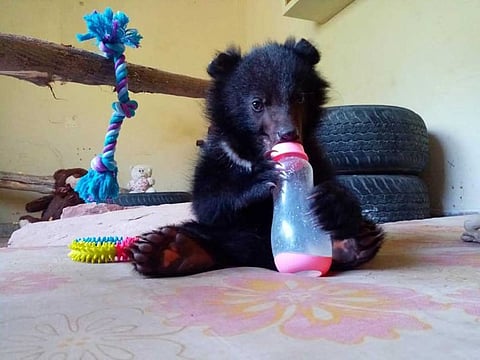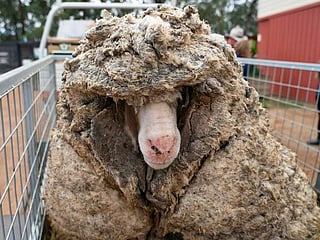Asian black bear cub rescued from wildlife poachers in Pakistan
Cub rescued by animal rights activists is now in care of Islamabad wildlife board

Also In This Package
Islamabad: An orphaned Asian black bear cub recently rescued by animal rights activists from the illegal wildlife traders in Pakistan is now making a quick recovery in Islamabad.
The nearly three-months-old bear named Daboo had a traumatic childhood as the poachers in Neelum Valley of Kashmir killed his mother and abducted the little one. He might have ended up in the transnational wildlife trafficking network or as a dancing bear on the streets had a local animal activist not bought him from the hunter.
“The cub was very young, hardly a month old, and his situation was critical with a severe infection in ears. He was scared, starved and part of his ears cut off,” Anila Umair, the animal rights activist who bought and nursed back the bear to health, told Gulf News. She along with another activist Anna Kazmi got the cub for Rs70,000 (US$440) from a person in contact with the poacher.
Daboo was given a temporary refuge and treatment by a vet as Anila made arrangements for his new home. “Our first concern was his health and we did everything for his survival,” said Anila, the founder of Critters Ark animal welfare organisation. At the same time, she started contacting local and global sanctuaries so he could “live safely and happily”. After caring for a month, they decided to give the cub into the care of the Islamabad Wildlife Management Board (IWMB). However, a day before the sendoff on May 26, Punjab Wildlife Department confiscated the bear and transferred it to Lahore Zoo as it is illegal to own a wild animal.
Animal lovers raised a hue and cry on social media saying that wild animals do not belong to the zoo, emphasising that IWMB was better equipped than Lahore Zoo to provide Daboo with the care, enrichment, nutrition and space he needs. With the help of lawyers, activists and officials including Anila, Anna, Yasmin Ali Zaidi, Hassan Niazi and IG Forests Suleyman Warraich, the little bear was finally transferred to IWMB on June 3.
Daboo enjoying life in his temporary home
Daboo’s traumatic journey from being orphaned and kidnapped to rescue from bear baiting or life in a zoo seems to be over. The latest videos shared by Islamabad wildlife officials showed him climbing trees, taking his first splashy shower in a tub and exploring the nearby home-like natural environment at Margalla Hills National Park (MHNP). Daboo’s adorable videos brought him many visitors but IWMB staff says, “it is harmful for bear to become too attached to humans and he needs peace”, assuring people that they will continue to update about his care and activities on social media.
“Daboo is healthy, active and now exploring his new room ready with enrichments and a cooler” says IWMB chairperson Rina Saeed Khan. The IWMB staffers, Anees and Jibran, who were trained in captive bear care at the Al Mawa sanctuary in Jordan run by Princess Alia Foundation, are taking care of the bear. “Daboo has settled in well in Islamabad and loves being outdoors and climbing trees but at night he has to be indoors as he’s still a baby” Rina told Gulf News.
The bear cub will stay in the care of IWMB staff until they find his new permanent home. Wildlife experts will discuss whether to send him to a bear sanctuary, release back into the wild or unite with other rescued bears. Pakistan’s Balkasar Sanctuary offers a safe home for bears rescued from bear baiting and bear dancing but it is filled beyond capacity, which is why the two Himalayan bears Bubloo and Suzie were sent to Jordan sanctuary when Islamabad Zoo finally closed down in December 2020. The 82-acres zoo premises will be transformed into a wildlife conservation facility.
Asian black bears
The population of Asiatic black bears is declining in most parts of the world and is marked as ‘threatened’ by the International Union for Conservation of Nature (IUCN). “Hunting and habitat loss have reduced black bear populations in Pakistan where poachers routinely steal cubs like Daboo who are then sold off into the cruel practice of bear baiting or bear dancing” says the IWMB statement. Although bear baiting was banned in Pakistan in 1980 and the longtime tradition of bear dancing has nearly ceased to exist in Khyber Pakhtunkhwa, Balochistan and Sindh, the practice still continues in Punjab province.
Cruel bear baiting practice
Bear dancing is a cruel practice where bears are often poached from the wild, and the cubs captured after killing their mothers. The bears are forced to dance or perform on the streets for money. Young animals are prepared for training by having their claws removed to prevent injury to the owner and their teeth filed down. A ring is also inserted into the bear’s nose so the handler can control the animal with a rope. These bears live in a constant state of fear and pain during the cruel training just to entertain people. Bears are typically taught to dance by placing them onto hot metal sheets. As the metal turns hot, the bears would be forced to lift paws in a motion that mimics dancing. This process is repeated over the sound of music, which the bear associates with the pain.
Sign up for the Daily Briefing
Get the latest news and updates straight to your inbox








